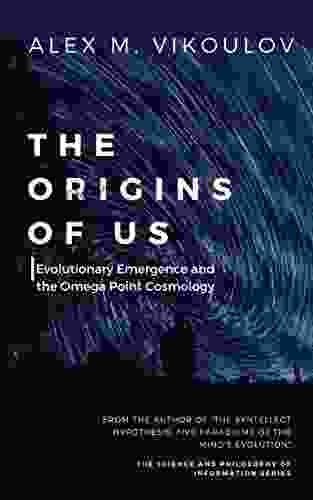The Origins Of Us: Evolutionary Emergence And The Omega Point Cosmology (The Science And Philosophy Of Information 1)

The concept of evolutionary emergence has captivated the minds of scientists, philosophers, and theologians for centuries. It explores the fundamental question of how complex systems arise from simpler ones, and its implications for our understanding of the universe and our place within it. In his groundbreaking work, Evolutionary Emergence and the Omega Point Cosmology: The Science and Philosophy, Dr. Robert Clyde explicates the concept of evolutionary emergence and its profound implications for understanding the cosmos.
What is Evolutionary Emergence?
Evolutionary emergence refers to the process by which new and more complex systems arise from interactions between pre-existing entities. It is a ubiquitous phenomenon observed in nature, from the formation of atoms to the evolution of life and even the emergence of human consciousness.
4.3 out of 5
| Language | : | English |
| File size | : | 2352 KB |
| Text-to-Speech | : | Enabled |
| Screen Reader | : | Supported |
| Enhanced typesetting | : | Enabled |
| Word Wise | : | Enabled |
| Print length | : | 98 pages |
| Lending | : | Enabled |
The Omega Point Cosmology
Dr. Clyde proposes the Omega Point Cosmology as a theoretical framework to explain the evolutionary emergence of the universe. This cosmology asserts that the universe is evolving towards a final state, the Omega Point, where all matter and consciousness converge into a singularity of infinite density, complexity, and interconnectedness.
The Scientific Basis of Evolutionary Emergence
Clyde draws upon a vast body of scientific evidence to support the concept of evolutionary emergence. He presents examples from particle physics, astrophysics, biology, and neuroscience, demonstrating the interconnectedness of different levels of reality and the emergence of novel properties as systems evolve.
The Philosophical Implications of Evolutionary Emergence
Beyond its scientific basis, evolutionary emergence also has significant philosophical implications. Clyde explores how this concept challenges traditional notions of causality, determinism, and the nature of reality itself. He argues that evolutionary emergence points towards a purposive and potentially conscious universe, where the emergence of complexity and interconnectedness is guided by an inherent drive towards greater wholeness.
The Omega Point and Human Destiny
The Omega Point Cosmology posits that the ultimate trajectory of the universe is towards a state of perfect unity and understanding. Clyde suggests that this implies a profound connection between our individual consciousness and the collective consciousness of the cosmos. He envisions a future where humans may participate in the ongoing process of cosmic evolution, contributing to the emergence of a more harmonious and interconnected universe.
Critique and Controversies
Like any groundbreaking theory, Evolutionary Emergence and the Omega Point Cosmology has its critics. Some scientists question the empirical evidence supporting the concept, while others view the Omega Point as a metaphysical construct rather than a scientific one. However, the theory's provocative ideas continue to stimulate debate and inspire further research.
Dr. Clyde's Evolutionary Emergence and the Omega Point Cosmology presents a thought-provoking and comprehensive exploration of one of the most fundamental questions of existence: how does the universe emerge, evolve, and ultimately reach its destiny? Through a masterful blend of science and philosophy, the book offers a fresh perspective on the nature of reality and the potential for human evolution. Whether you are a seasoned scientist, a curious philosopher, or simply seeking a deeper understanding of the cosmos, Evolutionary Emergence and the Omega Point Cosmology is a profound and enriching work that will challenge your assumptions and ignite your imagination.
4.3 out of 5
| Language | : | English |
| File size | : | 2352 KB |
| Text-to-Speech | : | Enabled |
| Screen Reader | : | Supported |
| Enhanced typesetting | : | Enabled |
| Word Wise | : | Enabled |
| Print length | : | 98 pages |
| Lending | : | Enabled |
Do you want to contribute by writing guest posts on this blog?
Please contact us and send us a resume of previous articles that you have written.
 Book
Book Novel
Novel Page
Page Chapter
Chapter Text
Text Story
Story Genre
Genre Reader
Reader Library
Library Paperback
Paperback E-book
E-book Magazine
Magazine Newspaper
Newspaper Paragraph
Paragraph Sentence
Sentence Bookmark
Bookmark Shelf
Shelf Glossary
Glossary Bibliography
Bibliography Foreword
Foreword Preface
Preface Synopsis
Synopsis Annotation
Annotation Footnote
Footnote Manuscript
Manuscript Scroll
Scroll Codex
Codex Tome
Tome Bestseller
Bestseller Classics
Classics Library card
Library card Narrative
Narrative Biography
Biography Autobiography
Autobiography Memoir
Memoir Reference
Reference Encyclopedia
Encyclopedia Aline Helg
Aline Helg Joanna De Klerk
Joanna De Klerk Amalia Andrade
Amalia Andrade Alden Marshall
Alden Marshall Alfred S Posamentier
Alfred S Posamentier Allison Fallon
Allison Fallon Paul W Papa
Paul W Papa Sandra Mathias
Sandra Mathias Jane Marbaix
Jane Marbaix George Makari
George Makari Amanda Kay Mcvety
Amanda Kay Mcvety Herman Kynaston
Herman Kynaston Alexander Arnfinn Olsen
Alexander Arnfinn Olsen Bruce R Hopkins
Bruce R Hopkins Steve Vogel
Steve Vogel Michael Huemer
Michael Huemer John O Donohue
John O Donohue Alan Tate
Alan Tate Jill Conner Browne
Jill Conner Browne Catherine Davidson
Catherine Davidson
Light bulbAdvertise smarter! Our strategic ad space ensures maximum exposure. Reserve your spot today!

 Brandon CoxProduction Chain Framework: Revolutionizing Plant Health Risk Management in...
Brandon CoxProduction Chain Framework: Revolutionizing Plant Health Risk Management in... Spencer PowellFollow ·10.7k
Spencer PowellFollow ·10.7k Jeff FosterFollow ·11.7k
Jeff FosterFollow ·11.7k Edwin BlairFollow ·12.2k
Edwin BlairFollow ·12.2k Joseph HellerFollow ·11.2k
Joseph HellerFollow ·11.2k Ervin BellFollow ·15.4k
Ervin BellFollow ·15.4k Ernest HemingwayFollow ·13.4k
Ernest HemingwayFollow ·13.4k Doug PriceFollow ·11k
Doug PriceFollow ·11k Graham BlairFollow ·12k
Graham BlairFollow ·12k

 Ignacio Hayes
Ignacio HayesUnveiling the Secret Spitfires: Britain's Hidden Civilian...
: The Untold Story of Britain's...

 Scott Parker
Scott ParkerLiving With Schizophrenia: A Father and Son's Journey
Schizophrenia is a serious...

 Ted Simmons
Ted Simmons"From Sign Up to Pass Out": The Shocking and Immersive...
Step into the...

 John Keats
John KeatsThe Development of Biographies and Philosophical...
The Alluring...

 Dan Brown
Dan BrownCapture Your Dream Wedding with Digital Wedding...
Your wedding day is...
4.3 out of 5
| Language | : | English |
| File size | : | 2352 KB |
| Text-to-Speech | : | Enabled |
| Screen Reader | : | Supported |
| Enhanced typesetting | : | Enabled |
| Word Wise | : | Enabled |
| Print length | : | 98 pages |
| Lending | : | Enabled |












